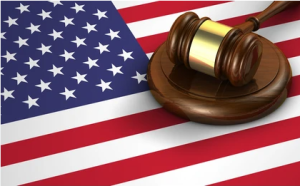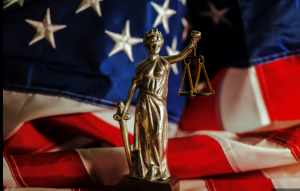Laws and Justice in the USA
- Introduction
- Definition of laws and justice
- Importance of laws and justice in the USA
- Historical Background
- Origins of laws and justice in the USA
- Evolution over time
- Branches of Government
- Legislative
- Executive
- Judicial

- Constitutional Basis
- Bill of Rights
- Amendments
- Types of Laws
- Civil law
- Criminal law
- Constitutional law
- Administrative law
- Justice System Structure
- Federal courts
- State courts
- Legal Process
- Investigation and arrest
- Trial process
- Sentencing
- Key Legal Principles
- Presumption of innocence
- Right to fair trial
- Due process
- Landmark Cases
- Examples of influential legal cases
- Impact on the justice system
- Contemporary Issues
- Access to justice
- Criminal justice reform
- Social justice movements
- Role of Legal Professionals
- Judges
- Lawyers
- Law enforcement
- Public Perception and Trust
- Challenges and controversies
- Efforts to improve transparency and accountability
- International Perspective
- Comparison with legal systems in other countries
- Global implications of US laws and justice
- Future Trends
- Technological advancements
- Changes in legal landscape
- Conclusion
- Recap of the significance of laws and justice in the USA
- Call to action for upholding principles of justice
Laws and Justice in the USA
Introduction
Laws and justice serve as the cornerstone of any society, providing a framework for maintaining order, resolving disputes, and safeguarding individual rights. In the United States of America (USA), the legal system is deeply entrenched in its history and culture, reflecting a commitment to democracy, equality, and the rule of law.
Historical Background
The roots of laws and justice in the USA can be traced back to its founding principles. Influenced by English common law, the American legal system has evolved over centuries, shaped by landmark events such as the Revolutionary War and the drafting of the Constitution.
Branches of Government
The US government is structured into three distinct branches: the legislative, executive, and judicial. Each branch has its own responsibilities, with the judiciary tasked with interpreting and upholding the law.
Constitutional Basis
The US Constitution, along with its Bill of Rights and subsequent amendments, serves as the supreme law of the land. These documents establish fundamental rights and outline the powers of the government, ensuring a balance of authority.
Types of Laws
In the USA, laws are categorized into various types, including civil law governing private disputes, criminal law addressing offenses against the state, constitutional law defining the structure of government, and administrative law regulating agencies and procedures.
Justice System Structure
The US justice system is comprised of federal and state courts, each with its own jurisdiction and authority. While federal courts handle cases involving federal law or disputes between states, state courts address matters concerning state laws and local ordinances.
Legal Process
The legal process in the USA typically involves investigation, arrest, trial, and sentencing. Defendants are entitled to due process and the presumption of innocence until proven guilty, ensuring a fair and impartial judicial proceeding.
Key Legal Principles
Central to the US legal system are principles such as the presumption of innocence, the right to a fair trial, and due process of law. These principles safeguard individual liberties and prevent arbitrary exercise of governmental authority.
Landmark Cases
Throughout its history, the USA has witnessed several landmark legal cases that have shaped jurisprudence and influenced societal norms. From Brown v. Board of Education to Roe v. Wade, these cases have had lasting impacts on civil rights, liberties, and governance.
Contemporary Issues
Despite progress, the US justice system grapples with challenges related to access to justice, disparities in sentencing, and racial and socioeconomic inequality. Efforts are underway to address these issues through criminal justice reform and social justice movements.
Role of Legal Professionals
Legal professionals, including judges, lawyers, and law enforcement officers, play crucial roles in upholding the rule of law and administering justice. Their expertise and dedication ensure the fair and efficient functioning of the legal system.

Public Perception and Trust
Public perception of the US justice system varies, with some expressing confidence in its integrity and others raising concerns about bias and corruption. Initiatives aimed at enhancing transparency and accountability are essential for restoring trust and confidence in the legal system.
International Perspective
The US legal system serves as a model for many countries around the world, yet it also faces criticism and scrutiny on the global stage. Comparisons with other legal systems offer valuable insights into areas for improvement and opportunities for collaboration.
Future Trends
Advancements in technology, such as artificial intelligence and blockchain, are reshaping the legal landscape and influencing how laws are drafted, interpreted, and enforced. Embracing innovation while upholding core legal principles is essential for adapting to changing societal needs.
Conclusion
In conclusion, laws and justice are fundamental to the fabric of society, ensuring order, fairness, and accountability. In the USA, a robust legal system built on democratic principles and constitutional rights serves as a beacon of hope and progress. By upholding the rule of law and promoting equality before the law, we can strive towards a more just and equitable society.
Frequently Asked Questions (FAQs)
- What is the role of the judiciary in the US legal system?
- The judiciary interprets laws, resolves disputes, and ensures that justice is served in accordance with the Constitution and legal precedent.
- How does the US legal system differ from those of other countries?
- The US legal system is based on common law principles and a constitutional framework, distinguishing it from civil law and other legal traditions.
- What are some recent developments in US criminal justice reform?
- Recent efforts include initiatives to reduce mass incarceration, address racial disparities in sentencing, and promote alternatives to traditional punishment.
- How do technological advancements impact the legal profession?
- Technology has led to innovations in legal research, case management, and dispute resolution, streamlining processes and improving efficiency.
- What can individuals do to support the principles of laws and justice in the USA?
- Individuals can educate themselves about their rights, participate in civic engagement, and advocate for policies that promote equality and justice for all.



